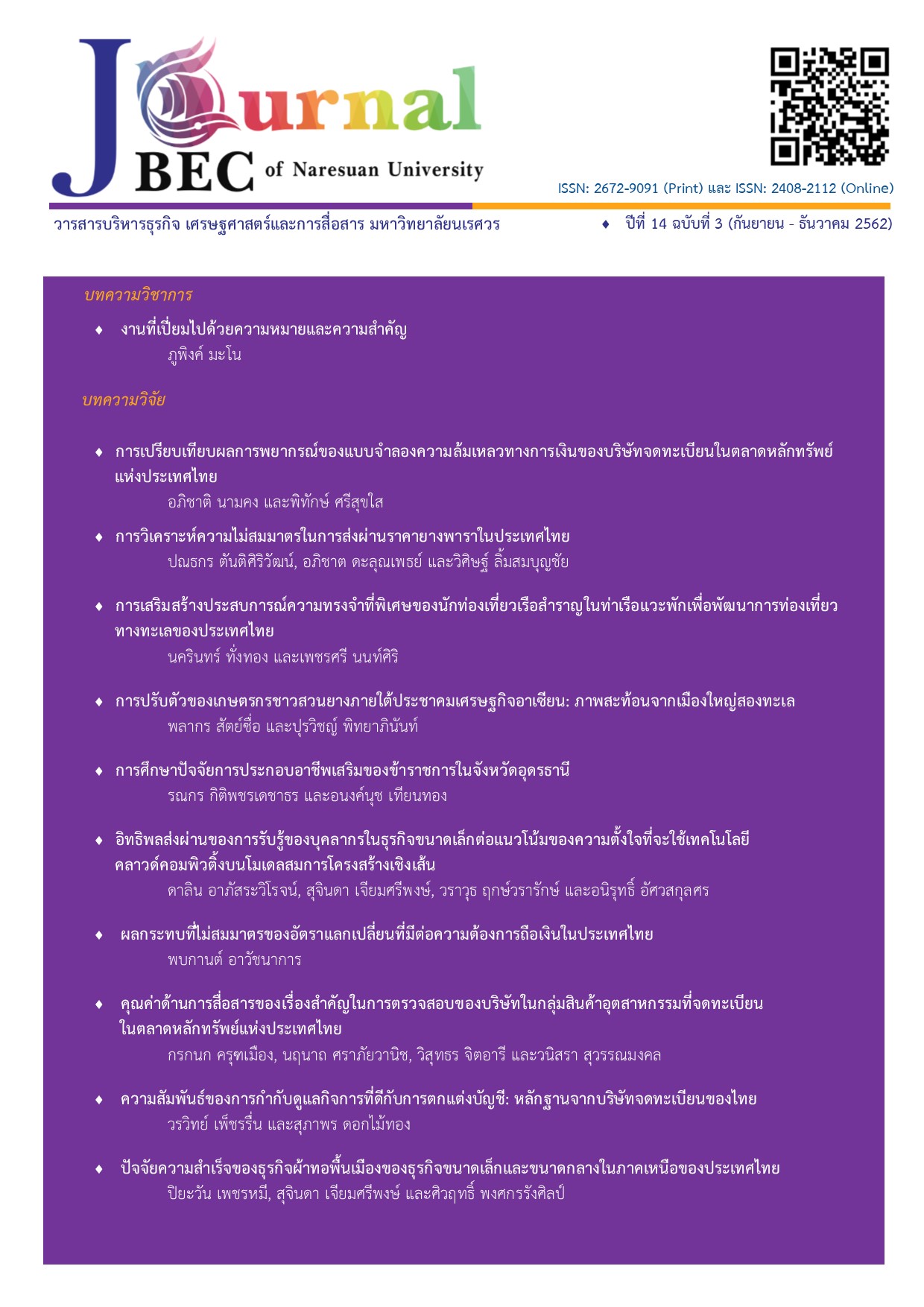การเสริมสร้างประสบการณ์ความทรงจำที่พิเศษของนักท่องเที่ยวเรือสำราญในท่าเรือแวะพัก เพื่อพัฒนาการท่องเที่ยวทางทะเลของประเทศไทย
Main Article Content
บทคัดย่อ
บทคัดย่อ
การวิจัยครั้งนี้มีวัตถุประสงค์เพื่อ 1) ศึกษาประสบการณ์ความทรงจำที่พิเศษของนักท่องเที่ยวเรือสำราญในท่าเรือแวะพักของประเทศไทย 2) ศึกษาความสัมพันธ์ระหว่างคุณลักษณะของท่าเรือแวะพัก
กับประสบการณ์ความทรงจำที่พิเศษของนักท่องเที่ยวเรือสำราญ 3) เสนอแนวทางในการเสริมสร้างประสบการณ์ความทรงจำที่พิเศษของนักท่องเที่ยวเรือสำราญในการพัฒนาการท่องเที่ยวทางทะเลของประเทศไทย ผลการวิจัยพบว่า 1) ประสบการณ์ความทรงจำที่พิเศษของนักท่องเที่ยวเรือสำราญในท่าเรือแวะพักของประเทศไทยประกอบด้วยการมีส่วนร่วม การมีปฏิสัมพันธ์กับเจ้าของวัฒนธรรม ความเพลิดเพลินทางอารมณ์ ประสบการณ์ที่มีความหมาย การเติมเต็มพลังชีวิต ความแปลกใหม่ การเรียนรู้ ประสบการณ์ที่สามารถโอ้อวดได้ และการได้รับการยกย่อง ตามลำดับ 2) คุณลักษณะของท่าเรือแวะพักมีความสัมพันธ์กับประสบการณ์ความทรงจำที่พิเศษที่ระดับนัยสำคัญ 0.01 3) การเสริมสร้างประสบการณ์ความทรงจำที่พิเศษควรมุ่งเน้นที่กิจกรรมและโปรแกรมการท่องเที่ยวที่สามารถสร้างการมีส่วนร่วมและการปฏิสัมพันธ์ระหว่างนักท่องเที่ยวกับคนในท้องถิ่นและควรจัดการอบรมด้านการให้บริการและการใช้ภาษาอังกฤษแก่ผู้มีส่วนเกี่ยวข้อง
คำสำคัญ: 1) การท่องเที่ยวเรือสำราญในประเทศไทย 2) ประสบการณ์ความทรงจำที่พิเศษ
Article Details
เอกสารอ้างอิง
2. Andriotis, K. and Agiomirgianakis, G. (2010). Cruise visitors’ experience in a Mediterranean port of call. International Journal of Tourism Research, 12(4), 390-404.
3. Arnould, E. J. and Price, L. L. (1993). River magic: Extraordinary experience and the extended service encounter. Journal of Consumer Research, 20(1), 24-25.
4. Bello, D. C. and Etzel, M. J. (1985). The role of novelty in the pleasure travel experience. Journal of Travel Research, 24(1), 20-26.
5. Bruner, E. (1991). Transformation of self in tourism. Annals of Tourism Research, 18(2), 238-250.
6. Chandralal, L. and Valenzuela F. R. (2013). Exploring memorable tourism experiences: Antecedents and behavioral outcomes. Journal of Economics, Business and Management, 1(2), 177-181.
7. Correia, A. and Moital, M. (2009). The antecedents and consequences of prestige motivation in tourism: An expectancy-value motivation. In M. Kozak and A. Decrop (Eds.), Handbook of tourist behavior – theory and practice (pp. 16-32). New York: Routledge.
8. Crouch, G. I. and Ritchie, J. R. B. (2000). The competitive destination: A sustainability perspective. Tourism Management, 21(1), 1-7.
9. Cruise Lines International Association. (2018a). Asia Cruise Trends 2018 Edition. Retrieved February 15, 2019, from https://cliaasia.org/wp-content/uploads/2018/08/asia-cruise-trends-2018.pdf
10. Cruise Lines International Association. (2018b). 2018 Cruise Industry Outlook. Retrieved January 2, 2019, from https://cruising.org/-/media/research-updates/research/featured/
2018-clia-state-of-the-industry.pdf
11. Dunman, T. and Mattila, A. S. (2005). The role of affective factors on perceived cruise vacation value. Tourism Management, 26(3), 311-323.
12. Ek, R., Larsen, J., Hornskov, S. and Mansfeldt, O. (2008). A dynamic framework of tourist experiences: Space-time and performances in the experience economy. Scandinavian Journal of Hospitality and Tourism, 8(2), 122-140.
13. Farber, M. E. and Hall, T. E. (2007). Emotion and environment: Visitors’ extraordinary experiences along the Dalton Highway in Alaska. Journal of Leisure Research, 39(2), 248-270.
14. Field, D. R., Clark, R. N. and Koth, B. A. (1985). Cruiseship travel in Alaska: A profile of passengers. Journal of Travel Research, 24(2), 2-8.
15. Gottlieb, A. (1982). American’s vacations. Annals of Tourism Research, 9(1), 165-187.
16. Greenwood, B. A. and Barron, P. E. (2006). Issues determining the development of cruise itineraries: A focus on the luxury market. Tourism in Marine Environments, 3(2), 89-99.
17. Gui, L. and Russo, A. P. (2011). Cruise ports: A strategic nexus between regions and global lines-evidence from the Mediterranean. Maritime Policy and Management: The Flagship Journal of International Shipping and Port Research, 38(2), 129-150.
18. Holbrook, M. B. and Hirschman, E. C. (1982). The experiential aspects of consumption: Consumer fantasies, feelings and fun. Journal of Consumer Research, 9(2), 132-140.
19. Kim, J. H., Ritchie, J. R. B. and McCormick, B. (2012). Development of a scale to measure Memorable Tourism Experiences. Journal of Travel Research, 51(12), 12-22.
20. Leibenstein, H. (1950). Bandwagon, snob and Veblen effects in the theory of consumers’ demand. Quarterly Journal of Economics, 64(2), 183-207.
21. Marti, B. E. (1991). Cruise ship market segmentation: A "non-traditional" port case study.
Maritime Policy Management, 18(2), 93-103.
22. Neuman, Y., Pizam, A. and Reichel, A. (1980). Values as determinants of motivation: Tourism and other career choices. Annals of Tourism Research, 7(3), 428-442.
23. Otto, J. E. and Ritchie, J. R. B. (1996). The service experience in tourism. Tourism Management, 17(3), 165-174.
24. Pine, B. J. and Gilmore, J. H. (1999). The experience economy: Work is theatre and every business a stage. Boston: MA Harvard Business Press.
25. Prentice, R. C., Witt, S. E. and Hamer, C. (1998). Tourism as an experience: The case of heritage parks. Annals of Tourism Research, 25(1), 1-24.
26. Quadri-Felitti, D. L. and Fiore, A. M. (2013). Destination loyalty: Effects of wine tourists’ experiences, memories and satisfaction on intentions. Tourism and Hospitality Research, 13(1), 47-62.
27. Selstad, L. (2007). The social anthropology of the tourist experience. Exploring the "Middle Role". Scandinavian Journal of Hospitality and Tourism, 7(1), 19-33.
28. Sun, X., Jiao, Y. and Tian, P., (2011). Marketing research and revenue optimization for the cruise industry: A concise review. International Journal of Hospitality Management, 30(3), 746-755.
29. Tarssanen, S. and M. Kylanen (2007). A theoretical model for producing experiences-A touristic perspective.” In Kylanen R. M. (Ed.), Articles on Experiences 2 (2nd ed., pp. 134-154). Finland: Lapland Centre of Expertise for the Experience Industry.
30. Tung, V. W. S. and Ritchie, J. R. B. (2011). Exploring the essence of memorable tourism experience. Annals of Tourism Research, 38(4), 1367-1386.
31. Thangthong, N. (July 26, 2017). Traveling behaviors of cruise passengers in Koh Samui port of call. In Ratchathani University National Conference 2017 (pp. 79-80). Ubonratchathani: Ratchathani University.
32. Vigneron, F. and. Johnson, L. W. (1999). A review and a conceptual framework of prestige-seeking consumer behavior. Academy of Marketing Science Review, 3(1), 1-15.
33. Wang, Y. and Pizam, A. (2011a). Destination marketing and management: Theories and applications. Oxfordshire, UK: CABI.
34. Wilson, E. and Harris, C. (2006). Meaningful travel: Women, independent travel and search for self-meaning. Tourism, 54(2), 161-172.


